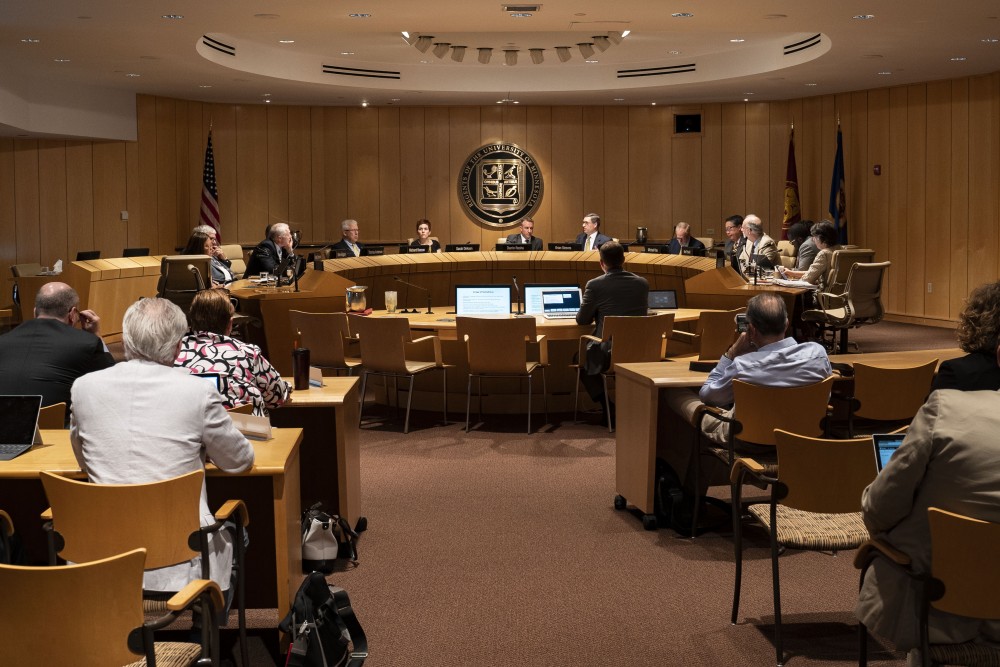After multiple University of Minnesota Board of Regents members questioned President Eric Kaler’s proposed tuition hikes, budget allocation and tuition increases continued to be under hot debate at the board’s June meetings Thursday and Friday.
Kaler’s budget proposal includes a 2.5 percent tuition hike for resident students on the Twin Cities campus, as well as a 1.5 percent increase for system campuses. Last month, the University received $43.5 million budget increase from the state legislature, only half of its ask.
“Just for perspective, 2.5 percent is $325 a year,” Kaler said to regents at the Thursday meeting. “Less than a dollar a day tuition increase we’re requesting on the Twin Cities campus.”
Despite Kaler’s proposal, multiple regents questioned whether a 2.5 percent increase is needed.
Newly elected student at-large regent Mike Kenyanya urged administration to consider a 2 percent tuition increase, as it would ease the burden for students and would help show the state legislature the board is doing what it can to keep tuition low.
Regent Ken Powell and board chair-elect argued that a 1.5 percent tuition increase on the Twin Cities campus is reasonable.
“One-and-a-half percent is really what the underlying rate of inflation is in the U.S.,” he said. “I think we can look at our fellow Minnesotans in the face and say, ‘Look, there is some inflation and we need to cover it but we’re not going beyond that.’”
However, Kaler argued that an extra increase is needed to support future initiatives of President-designate Joan Gabel, who assumes her position July 1. The increase would also be a good investment for the future success of the University, he added.
Newly elected regent Ilean Her was skeptical about whether the proposed increase is justified.
“I love it that the president is saying that he values people and wants to invest in people, but at the same time this budget is really on the backs of people,” Her said. “It’s on the backs of our students … it is going to hurt people.”
In response to Her’s comments, Kaler disagreed and said that the University “is relatively more affordable now than it was eight years ago.”
Multiple regents also said they believe non-resident, non-reciprocity tuition is at a reasonable rate and could go even higher to meet the rates of other universities in the Big Ten. In December, the regents voted to increase non-resident, non-reciprocity tuition by 10 percent, which will go into effect this fall.
University employees troubled by pending budget
Tuition and budget discussion continued on into Friday. The board held a public forum, in which approximately six University employee and union members voiced their concerns about budget allocation.
Multiple members from the University’s clerical workers union, AFSCME Local 3800, were in attendance to inform the board about low employee wages and health care concerns, among other employment issues. Union president Cherrene Horazuk gave a motivated, prepared message to the board.
“It’s shameful that the tuition is so high and salaries are so low that U workers can’t afford to pay their student loans while working at their alma mater,” Horazuk said. “It’s not a question of staff versus students. Stop balancing the budget on both our backs.”
She said AFSCME attended the public forum because clerical workers are often at the forefront of cuts and could be affected greatly by allocation decisions in the University’s budget.
Other members in attendance from the International Brotherhood of Teamsters union noted concerns regarding their employment. They said they hoped to see the board and unions work together in the future to retain long-time employees.
Expansion of alcohol sales
Regents also approved a resolution to expand alcohol sales to general seating at Williams and 3M at Mariucci arenas, the University’s basketball and men’s hockey arenas. The board held little discussion before the vote, but Regent Darrin Rosha questioned whether the board would be informed when alcohol sales could be cut off during games.
University Athletic Director Mark Coyle and the president’s Chief of Staff Jon Steadland presented to the board, proposing that alcohol sales cease at the end of halftime for basketball and after the second intermission for hockey games.
Approval of new board officers
Regents Ken Powell and Steve Sviggum were voted chair and vice chair respectively for the 2019-2021 term by board members Friday. In a last-minute nomination, Regent Randy Simonson spoke up to nominate Regent Darrin Rosha as vice chair. Rosha was defeated in a 8-3 vote to Sviggum. Powell was appointed chair unanimously.
Sviggum was absent for the vote due to a family emergency, board chair David McMillan said during the meeting.
Kate Crockett contributed to this report.







